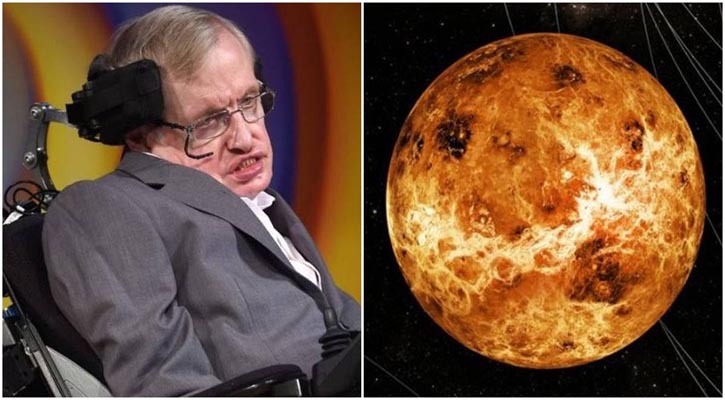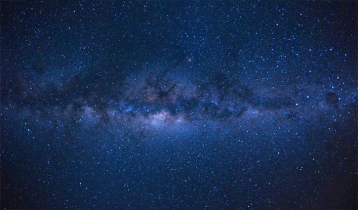Stephen Hawking warns Earth will become a hellish Venus
4 || risingbd.com

Risingbd Desk: Professor Stephen Hawking has warned that Earth will become unbearably hot, hellish world if global warming continues.
The physicist has previously said President Donald Trump’s decision to withdraw from the Paris Climate Agreement has doomed our planet.
Now Hawking has reiterated his prediction, saying Earth will one day look like the 460°C (860°F) planet Venus if we don't cut greenhouse gas emissions.
In the second episode of his Emmy-winning series 'Favourite Places', which is available to stream worldwide through the website CuriosityStream, Hawking visits the planet Venus via a series of CGI backdrops.
Venus, the second closest planet to the sun, was much like Earth 4 billion years ago, according to Nasa.
The planet was habitable for around 2 billion years, with water at its surface and mild temperatures similar to Earth's.
A build up of greenhouse gases in Venus's atmosphere burned off its oceans and turned it into the scorching hot planet seen today, with winds of up to 180mph (300km/h).
Venus is an example of runaway greenhouse warming, Hawking says, something that could happen on Earth if greenhouse gases in the atmosphere reach extreme levels.
'Next time you meet a climate change denier, tell them to take a trip to Venus. I will pay the fare,' Hawking says.
Hawking has previously warned that planet Earth will soon become inhabitable if climate change continues.
He has slammed US President Donald Trump's decision to withdraw from the Paris Climate Agreement last year.
In 2015, around 195 nations signed the agreement which set measures to reduce greenhouse gas emissions to prevent temperatures rising by more than two degrees in the next 50 years.
But Trump announced in June 2017 the start of a three-year process to pull out of the pact, arguing that it would put the US at an economic disadvantage.
In response, Hawking said: 'I am not denying the importance of fighting climate change and global warming, unlike Donald Trump, who may just have taken the most serious, and wrong, decision on climate change this world has seen.'
The comments were made at the Starmus Festival celebrating science and the arts, in Trondheim, Norway, in June.
Hawking added that humanity must find a new home in space in the next 200 to 500 years if we are to survive.
He called for leading nations to send astronauts to the Moon by 2020 in a bid to re-ignite space exploration.
They should also aim to build a lunar base in 30 years' time and send people to Mars by 2025, he said.
'Spreading out into space will completely change the future of humanity,' he said.
'I hope it would unite competitive nations in a single goal, to face the common challenge for us all.
'A new and ambitious space programme would excite (young people), and stimulate interest in other areas, such as astrophysics and cosmology'.
He revealed his hope nuclear fusion-powered ships propelled by light or another energy form will guide us to our new home.
'The Earth is under threat from so many areas that it is difficult for me to be positive,' he admitted.
'The threats are too big and too numerous.
'Our physical resources are being drained, at an alarming rate. We have given our planet the disastrous gift of climate change.
'Rising temperatures, reduction of the polar ice caps, deforestation, and decimation of animal species. We can be an ignorant, unthinking lot.'
Professor Hawking is working with Russian billionaire Yuri Milner's Breakthrough Starshot project to send a fleet of tiny 'nanocraft' carrying light sails on a four light-year journey to Alpha Centauri, the nearest star system to Earth.
'If we succeed we will send a probe to Alpha Centauri within the lifetime of some of you alive today,' he said.
'It is clear we are entering a new space age. We are standing at the threshold of a new era. Human colonisation and other planets is no longer science fiction, it can be science fact.'
Source: The Mail
risingbd/Jan 11, 2018/Mukul
risingbd.com




































